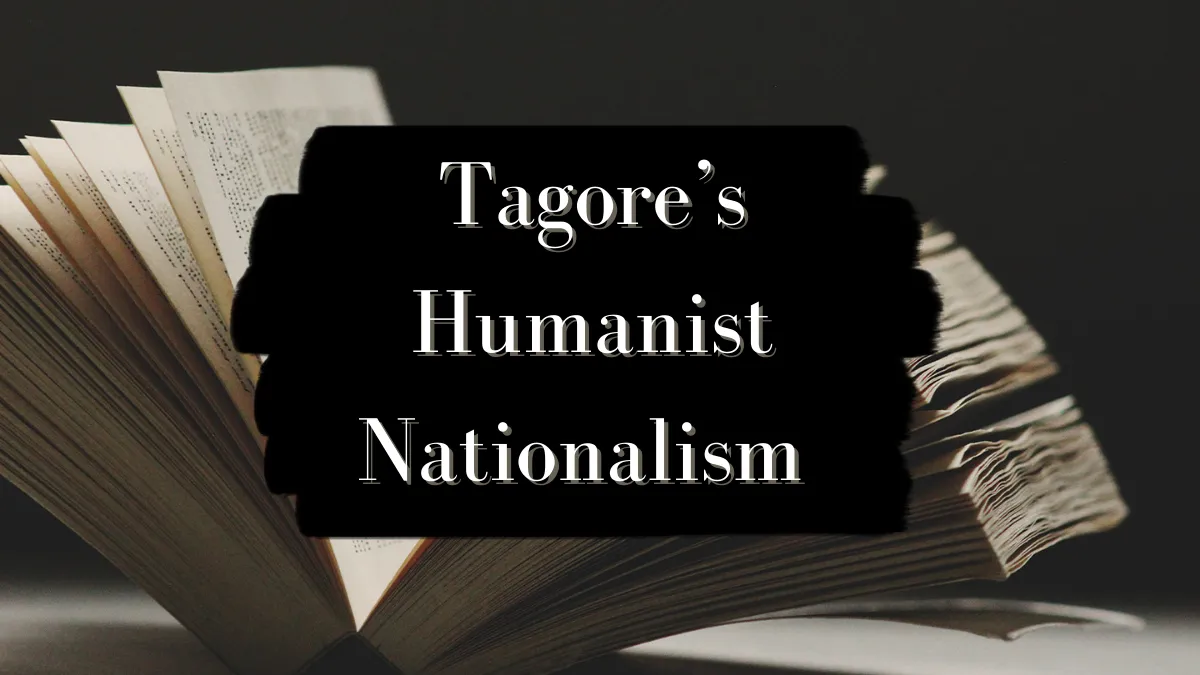“India has never had a real sense of nationalism” – Rabindranath Tagore
The quote above was penned by Asia’s first and most visionary Nobel laureate, Rabindranath Tagore. The author, a mystic orient who placed his truth and conscience before the notion of nationalism or parochial patriotism, tries to unravel the dark reality of Western nationalism and the repercussions of spiritually idealizing a nation. To Tagore “there is only one history—the history of man. All national histories are merely chapters…” For more let us further explore Tagore’s Humanist Nationalism.
Tagore’s Understanding of True Freedom
Tagore was a benefactor of the concept of ‘true freedom’ which would break the shackles of bondage and go far beyond the idea of Political freedom for a country. According to him, “those people who have got their Political freedom are not necessarily free, they are merely powerful.” He defines ‘nation’ as a social construction levied to achieve a mechanical purpose. Invoking the archaic spiritual history of India, Tagore imbibed an audacious understanding of ‘true freedom’ for his countrymen, which is a condition through which an individual takes himself near to the ‘Supreme Reason.’ Political independence does not elevate the personality of individuals to this level of perfection. He visualized four stages of ‘True Freedom’ which are:
- Realization of freedom at the individual level
- Realization of freedom at the community level
- Realization of freedom from the community level to the universe
- Realization of freedom from universe to infinity and beyond (getting near to the Supreme Reason)
Decryption of Western Nationalism
Rabindranath Tagore was primarily against the byzantine system of ‘possessive individualism.’ Individuals must free themselves from the bondage of self, community, ethnocentric attitude and must widen his world overview. Tagore believed that this was possible only when an individual started to isolate themselves from the material attachments in life and worldly perception of the self itself. Delineating the complex maze of nationalism, it’s position in the world and its relation to India, Tagore emphasizes that “there is only one history- the history of man. All national histories are merely chapters…” Tagore observed that European nationalism was deceptive and against the true nature of freedom. It was a product of modern science and industrial revolution in Europe. It was mechanical coming together of people solely for commercial and economic purposes.
Such ideas go against the greater interest of humanity. Thus, Western nationalism breads and intense and unending lust for power and money; it lacks ethics, social and moral values, making their nationalism ignoble and aggressive. Tagore believed that since nationalism emerged in the post-religious laboratory of industrial capitalism, it was only an “organization of politics and commerce” that brings “harvest of wealth” or “carnivals of materialism.” Nationalism according to Tagore, is not a “spontaneous self-expression of man as a social being” where human relationships are naturally regulated “so that man develop ideals of life in cooperation with one another but rather a political and commercial union of a group of people, in which they congregate to maximize their profit, progress and power. Tagore called into question the constricted aspect of nationalism, which stifled the innate and instinctive qualities of human beings and overemphasized the capitalistic aspect.
Tagore’s Critique on The Indian Freedom Struggle
Tagore was pained to see how the Indian National leaders forcefully imposed the western brand of Nationalism on India. Tagore argued that India was primarily many cultures and heritage amalgamating together to act as one social unit as opposed to its western counterparts which generally shared a common cultural lineage and bonhomie but was divided into many parts because of its vested interest (we find proof of this argument in “The Prince” by Nicollo Machiavelli). In his short story “Purification,” Tagore exposes the absurdity of Gandhi’s Satyagraha movement and the hypocritical, bacchanalian attitude of the Indian nationalist in the name of freedom struggle. He exposed how selfish and superficial the Indian nationalist leaders (primarily of Indian National Congress) were in their quest for Swaraj (political freedom). They castigated the larceny and trepidation of the British colonial rule but on the other hand did all the necessary deeds to oppress the poor and backward classes, hinder their liberation, maintain their elitist western standard while prattling their desire to liberate the Indian masses from bondage.
Such “mendicant politics” that fails to tear down the customary barriers between people, was of little worth to Tagore. Tagore emphasizes racial and religious unity persistently in his writings. In a beautiful hymn to India, entitled ‘Bharat Tirtha’ (The Indian Pilgrimage), he urges all Indian to unite across race, religion, caste and class, shedding their differences, to fulfill the noble destiny of their homeland, standing above the whirlwind of dusty politics. Thus he writes, “Come, O Aryans, come, Non-Aryans, Hindu, Mussulmans (Muslim)…Come, O Brahmin, cleansing your mind Join hands with all of them…Let the burden of every insult be forever dispelled…Make haste and come to Mother’s Coronation…By the shore of the sea of Bharat’s (India) Great Humanity!” However, Tagore believed to break the spell of stasis through cultural/intellectual revival and liberate India from the tyranny of the past and the towering misery of unreason, unbridled orthodoxy, India ought to keep itself open to the west (especially emphasized on America, land of opportunities and for all) and not become insular from the rest of the world through the appropriation of provincial nationalism. The west could in fact redeem India from some of its “mind forg’d manacles” and lift the dead weight of tradition from its soul through a constructive engagement process of tolerance and tenacity.
Tagore’s Message to America
For America, Rabindranath Tagore had a special message: “I cannot but think that it is the special mission of America to fulfill this hope of God and man. You are the country of expectation, desiring something else then what is…The foundation of her glory is in the future, rather than in the past; and if one is gifted with the power of clairvoyance, one will be able to love the America that is to be.” Tagore’s idea of humanism was also enshrined in his synthetic universalism. This principle seems to extend beyond national frontiers and towards a universal dimension. He travelled in every cultural sphere to bring unity among the people. He was definitely different from his contemporaries. Naturally, he has been misunderstood, miss criticized in various ways.
In spite of all these limitations, Tagore was a social thinker and had a firm belief in the potential of men to overcome all obstacles on the way to emancipation. A day will come when the unvanquished will retrace his part of conquest, despite all barriers, to win back his lost human heritage.






